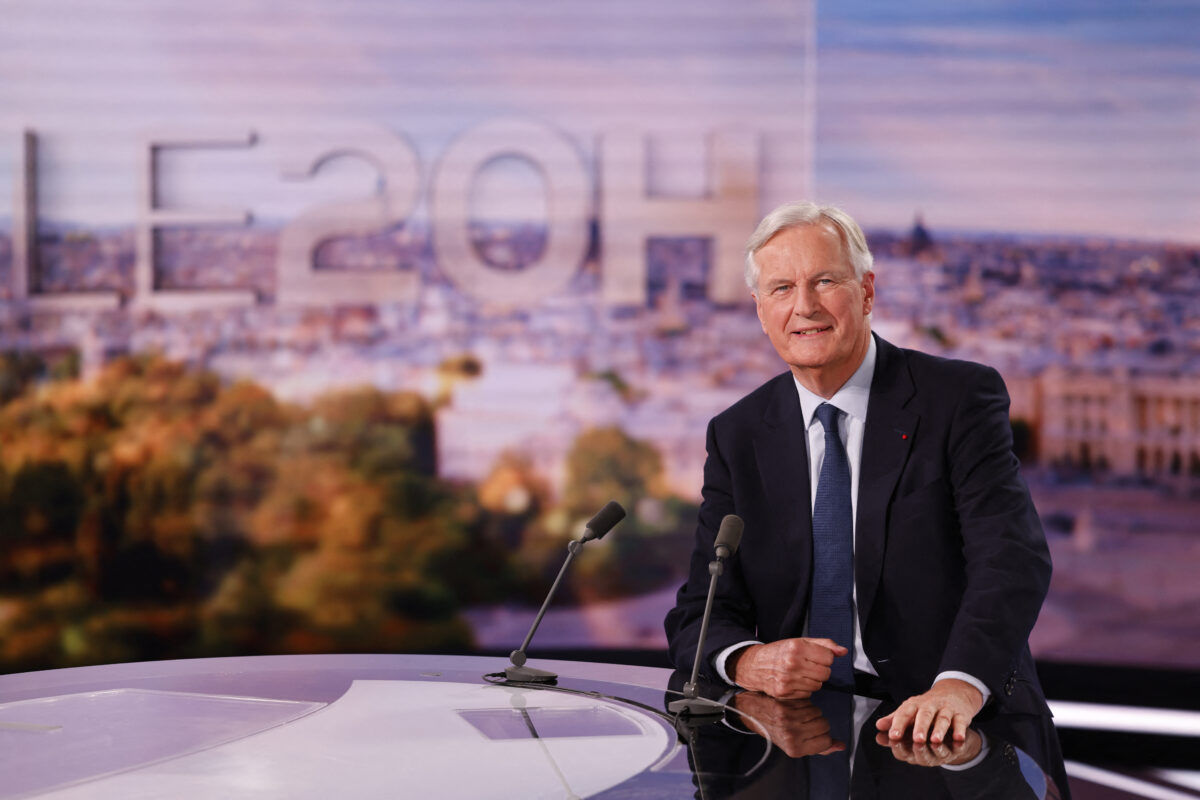France’s new PM constructs cabinet under far right shadow

France’s newly appointed Prime Minister, Michel Barnier poses during the evening news broadcast of French TV channel TF1 with French journalist and TV host Anne-Claire Coudray in Boulogne-Billancourt, outside Paris on September 6, 2024. (Photo by Ludovic MARIN / POOL / AFP) / MAG SOLELY FOR ABACA
PARIS — France’s new right-wing prime minister Friday sought to cobble together a government capable of mustering parliament backing, as critics lambasted the president for turning the far right into a kingmaker after snap polls.
Michel Barnier, a 73-year-old former foreign minister who recently acted as the European Union’s Brexit negotiator, is the oldest premier in the history of modern France.
He vowed in a prime-time TV interview late Friday that he had “nothing, or not much, in common with the theories or ideology of the National Rally” (RN), the far-right outfit that became the single largest party in a fragmented parliament after the polls on July 7.
President Emmanuel Macron took the risk of dissolving parliament in June after the far right trounced his alliance in European elections.
But where he hoped to defuse the RN’s appeal, the party made massive gains.
Combined with a bumper result for the left-wing NFP alliance, that cost Macron’s centrists their relative majority in the National Assembly.
The left ended up as the largest bloc but far from an absolute majority, leaving Macron wiggle room to avoid naming their pick as head of government to howls of outrage.
But the president has for weeks been trying to identify a potential prime minister who would not immediately be toppled in a confidence vote, consulting especially with the RN on who they might accept.
Gestures to the left
Macron landed on traditional conservative Barnier to replace 35-year-old Gabriel Attal — a centrist half his age who was the country’s first openly gay premier.
Le Pen, who leads RN lawmakers in parliament, has said her party would not be part of the new cabinet, and would wait for Barnier’s first policy speech in front of parliament to decide whether or not to back him.
The left in particular has bristled at Barnier’s nomination and will likely seek to topple him in the lower house.
Barnier himself told broadcaster TF1 Friday that he was opening to naming ministers of all political stripes, including “yes, people from the left” and made several policy gestures towards the NFP.
He suggested “more tax justice” — hinting at taxing the wealthiest more heavily — to fund France’s ailing public services, while also calling for faster growth powered by business.
Barnier also said he would seek “improvements” to Macron’s unpopular 2023 pension reform, a bugbear for the left which included an increase in the official retirement age to 64.
“I will open the debate on improving this law for the most vulnerable people, and I will do it with the social partners” in business and trade unions, Barnier said — while insisting on “sticking to the budgetary constraints”.
And he equated France’s massive government debt — around 110 percent of output — with an environmental “debt” of failure to act on climate change and other issues.
“We’ve had enough of signing blank cheques at the expense of future generations on the environment as well as on the public finances,” Barnier said.
“We won’t increase this debt.”
He also said he would address immigration, one of the far-right’s favorite themes.
“People still feel that the borders are like a sieve,” Barnier said, adding that “we will get migration flows under control,… in a tough and humanist way.”
No-confidence motion
Ahead of Barnier’s interview, Manuel Bompard, coordinator of the hard-left France Unbowed (LFI), accused Macron of “betraying” the voters who in the second round of the elections of July 7 had voted tactically to prevent the far right coming to power.
“It’s a Macron-Le Pen government,” he told BFMTV, describing three-time presidential candidate Marine Le Pen as a “kingmaker” for the president.
“It can only see the light of day because the National Rally has decided to give it its blessing,” he added.
Lucie Castets, the 37-year-old economist who the left wanted to become premier, vowed to table a motion of no confidence against Barnier.
Le Monde daily described Barnier as a “prime minister under the surveillance of the RN.”
The left-leaning Liberation daily put a picture of Barnier on its front page with “approved by Marine Le Pen” as a rubber stamp.
Both Attal, now leading Macron’s centrist troops in parliament, and his conservative counterpart Laurent Wauquiez said their camps could join Barnier’s government, but would wait and see what his policies are first.